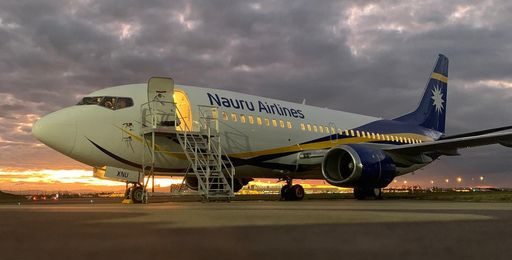Brisbane-based Nauru Airlines has marked the beginning of a new chapter as a growing freight carrier with the addition of Australia’s first Boeing 737-800F to its fleet.
Although the airline is headquartered on Nauru, the country’s flag carrier has been based out of Brisbane Airport for 20 years and is registered under Australia’s Civil Aviation Safety Authority and local aviation standards.
Due to the small population on Nauru, the airline has increasingly pivoted towards charter and freight services to help generate revenue and sustain passenger flights to and from the island.
For Dr Kieren Keke, the Chairman of the Board of Nauru Airlines, the launch of the freighter represents “new beginnings” for the airline, which once had its aircraft impounded when the country defaulted on a loan.
“It’s a new generation aircraft that’s more efficient and it gives us a lot more capacity to offer,” Keke told SkyNews.com.au ahead of an unveiling event at Brisbane Airport hangar on Saturday night.
“Nauru Airlines was established to connect Nauru to Australia and the Pacific but it’s a very challenging thing to maintain commercially on its own. A big part is doing work for other operators and airlines out of Brisbane.”
Keke is also a member of the Parliament of Nauru and has previously served as Minister of Finance and Minister of Foreign Affairs for the island nation.
With a population of about 10,000 people, equal to a mid-sized Australian suburb, Nauru has had a dramatic history marked by wildly changing fortunes since achieving independence in 1968.
The country was once one of the world’s wealthiest per capita thanks to phosphorus mining on the island, which briefly enriched Nauru to a point it was nicknamed the “Kuwait of the Pacific” in the 1970s.
The proceeds of phosphate mining were placed in a sovereign wealth fund that the country used to invest in overseas real estate to generate lasting income.
However, poor investments and corruption meant the entire wealth fund was squandered, leaving the country virtually bankrupt just as phosphate reserves were depleted.
A legacy of the phosphate boom is the 52-storey skyscraper “Nauru House” in Melbourne’s CBD.
The country financed the tower using money from the wealth fund but later lost the landmark building to bankruptcy in 2004.
During the boom years, Nauru Airlines was largely subsidised by the government and flew with a low load factor to a range of cities from Sydney to Taipei.
Today, after staving off debt and near bankruptcy, Nauru Airlines has become a viable commercial airline by offering passenger, charter and freight services across the central Pacific.
Operating a fleet of about six aircraft, the flag carrier has become a source of pride for the country, with Saturday’s launch attended by the country’s President Russ Kun and many of Nauru’s parliamentarians.
“For Nauru, we at times have needed to operate two freight flights. We can get almost the same tonnage using one flight with the 800 so you’re halving the cost of the freight,” Keke said.
The new freight aircraft, which carries about 24 tonnes of cargo, will also come as a welcome relief to Nauru’s neighbours.
Freight services are a lifeline for island nations in the Pacific, which must import most of their fresh water, foodstuffs, medical supplies and other essentials.
“The northern Pacific has traditionally been reliant on U.S operators,” Keke said.
“Earlier this year, the Marshall Islands had problems with their freight operator and actually had to declare a state of emergency.”
As the Marshall Islands government went back and forth with the operator for weeks, Nauru Airlines stepped in to help deliver essential goods to the islands.
“We provided some relief services to help remove the backlog cargo (and now) they’re interested in additional freight and passenger services,” he said.
In May, Nauru Airlines applied to the United States Department of Transport for permission to fly scheduled cargo and passenger flights to Guam, to take on US operators head on.
As the airline acquires more aircraft and seeks to become a major player in the region, Keke said Nauru Airlines will continue to serve the country’s citizens. “It’s not just growth for growth’s sake, we’re growing to enable us to sustain those services to Nauru and keep Nauru connected,” he said.
